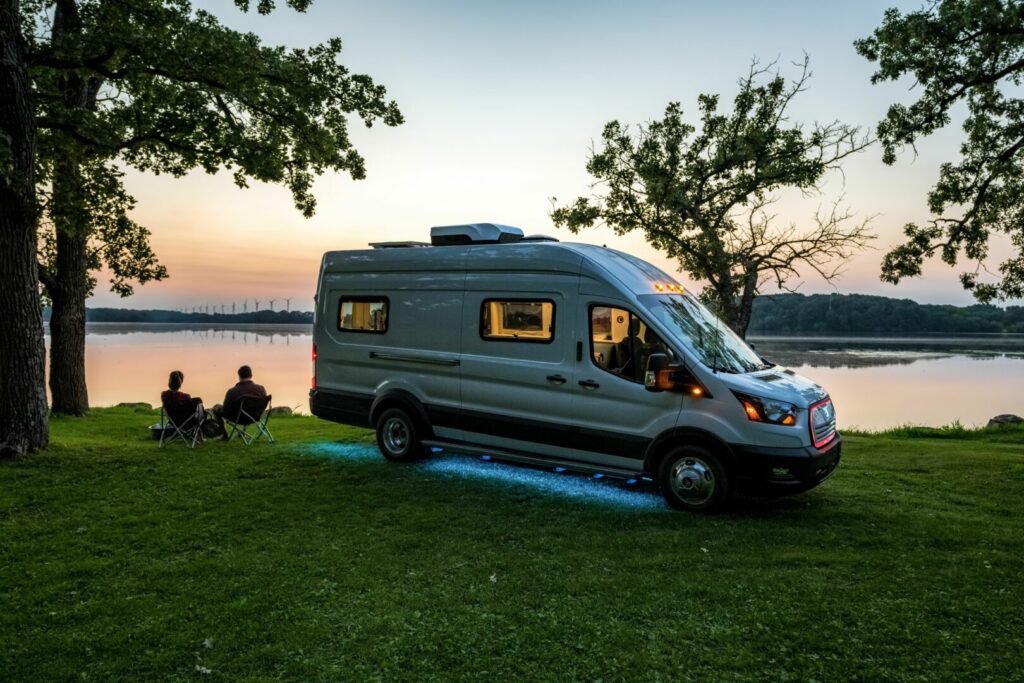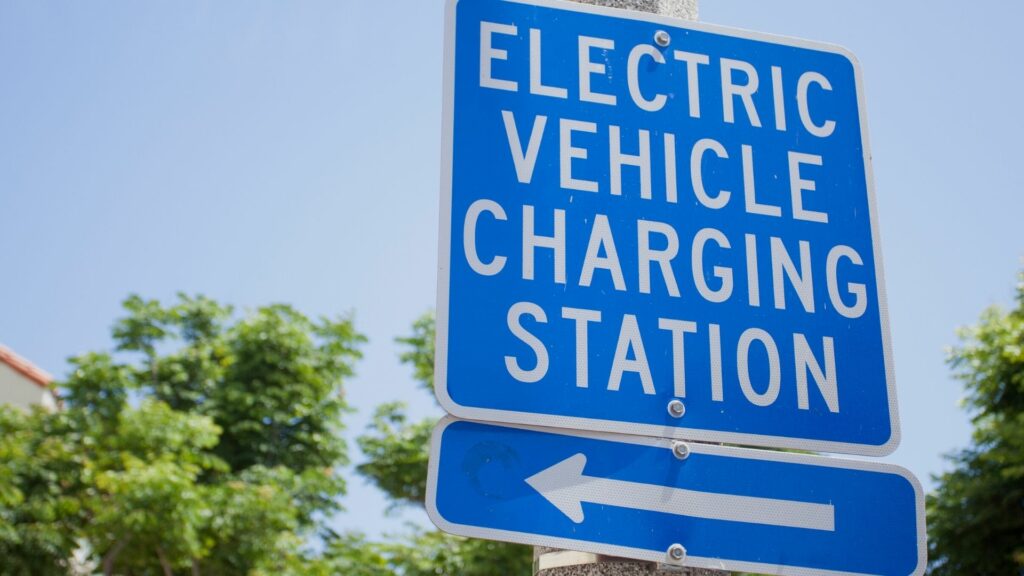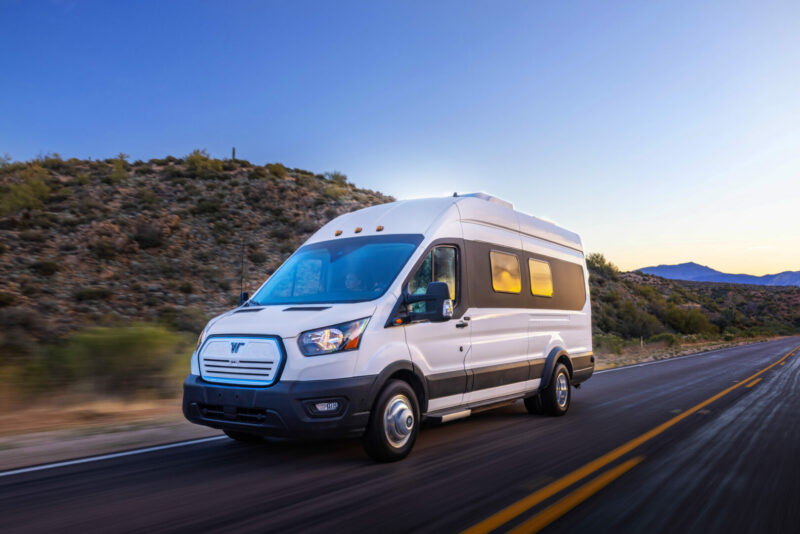Table of Contents Show
In a world where electric cars are quickly becoming the norm, it’s not hard to imagine the potential for other electric vehicles, including the electric RV.
For years, consumers have been calling for more sustainable and environmentally friendly transportation options. It’s no surprise that vehicle manufacturers are starting to make a switch toward the future.
Though we see the electric movement growing, we have to ask: are current RV users willing to make the switch? Let’s dive a bit deeper to get a better grasp on the future of RVing.
What Is an Electric RV?
Before we begin, let’s talk a little about what makes an RV electric. An electric RV is designed to run entirely on a fully electric motor. It gains its power through rechargeable batteries or solar power.
As with other electric vehicles, the RV requires a dedicated connector for recharging the battery. These RVs are meant to function similarly to standard fuel RVs. Ideally, electric RVs would reduce emissions, road noise, and money spent on fuel.

Are There Any Electric Powered RVs?
While several concept electric RVs are slated to be released in the coming years, there is currently only one on the market. However, this may not be the case for much longer. Demand for more electric vehicles is only increasing; supply must increase to meet the need.
Pro Tip: Do you know if RVs Are Bad for the Environment? Read the article to find out more.
Which RV Manufacturers Are Developing Electric RVs?
We’ve compiled a shortlist of some of the most popular RV manufacturers developing electric RVs. The list features names mostly within the United States, but one entry takes us to Germany. The majority of the RVs listed below are still in the concept phase.
Winnebago
Winnebago recently announced its concept for the e-RV at the Florida RV SuperShow. In a press release, Winnebago called its e-RV “the first all-electric zero-emission motorhome concept from a major RV manufacturer.”
Based on the body and functionality of the Ford Transit, the concept boasts a complete range of in-vehicle appliances and sought-after gallery amenities. These features will draw power from the industry-standard 86kWh battery on board, the same battery that powers the RV’s electric engine.
The expected range for a fully charged e-RV is 125 miles. This range accounts for full use of onboard systems while the RV is in transit. While Winnebago hasn’t set a date for when its concept will make it to the market, it has announced that it anticipates the e-RV to be the first in a long line of electric RVs.

Thor
Thor Industries announced its RV concepts at the Florida RV SuperShow in January. Thor’s concept for the electric motorhome was introduced as the THOR Vision Vehicle. Created in tandem with Roush, the concept includes an entirely electric chassis.
With a predicted range of around 300 miles, the THOR Vision Vehicle intends to push the limits of how far an electric vehicle can go on a single charge. Thor hopes to increase the RV’s range and create sustainable energy through the use of fuel cells.
Iridium EV
There’s only one electric RV currently on the market: the Iridium E-Mobil RV. It first appeared on the market in 2018 after being introduced at the Travel Fair in Stuttgart, Germany. When first announced, the RV could only achieve 124 miles per charge.
In 2019, the company released a second generation of the RVs with a 106kWh battery and an increased range of 250 miles per charge. The system relies completely on lithium batteries and requires a dedicated charging plugin.
At this time, the Iridium E-Mobil RV is only available in Europe. There appear to be no plans to bring this particular RV to America. As for the future of Iridium’s RV plans, it has announced that it will be making a shift to manufacturing completely electric vehicles.
Airstream
Thor Industries, the parent company of Airstream, released a concept for the eStream. The eStream is Airstream’s electric answer to the classic trailer.
Modeled in the classic Airstream style, the eStream contains dual electric motors. Perhaps the thing that sets the eStream concept apart from other similar RV concepts is the remote control feature.
Users can control the eStream remotely to aid with positioning while parking. Airstream’s commitment to an electric future is in line with Thor Industries’ official position. It seems that this is only the first of Airstream’s future electric offerings.
Does Tesla Make an RV?
It’s hard to talk about electric vehicles and not talk about Tesla. In recent years, Tesla has risen to the front of the market when it comes to electric alternatives in transportation. This begs the question: will Tesla venture into the RV space?
While Tesla has not announced any plans to develop an electric RV, others are taking on the task of developing electric campers compatible with Tesla’s already existing products. According to an article from Insider, a software company called Stream It has recently shifted its focus to creating electric pop-up attachments that will allow Cybertruck owners to have an optimized RV experience.
The pop-up concept, called CyberLandr, is on par with what you might expect from an up-to-date software company. The features include solar-powered electricity, voice-activated lights, heated bathroom tiles, and the ability to transform the bedroom into an on-the-go office.
Though the Cybertruck has yet to be released, Stream It is confident it can build an electric camper that seamlessly fits the Tesla brand and style.
Pro Tip: If you can’t picture yourself camping without your Tesla, you can consider bringing it along. But Can You Flat Tow a Tesla Behind a Motorhome?

What Are the Benefits of an Electric RV?
You may find yourself wondering if an RV powered solely by electricity is something you would consider. Let’s look at some of the pros and cons that could come along with owning one.
One of the most attractive features of electric vehicles is that they emit zero pollutants and are therefore more environmentally friendly. In addition, they’re easier to maintain due to the electric motor. Electric cars also tend to handle better on roads as they typically weigh less than their standard fuel counterparts.
Another enticing feature to keep in mind is the amount of money you can save on gas each year. According to Consumer Reports, on average, a first-time buyer of an electric vehicle can save an estimated $4,700 on gas alone in the first seven years.
Though the majority of the reports published on the advantages of electric vehicles focus primarily on passenger cars, it stands to reason that we can apply these same advantages to soon-to-be-released RVs.
What Are the Disadvantages of an Electric RV?
Though there are several advantages to owning and driving an electric RV, a few obstacles may stand in the way of some longtime campers making the switch.
Perhaps the two biggest challenges facing the RVs are range and charging stations. Most standard RVs land somewhere between 440 and 810 miles on a full tank of gas. With these numbers, it’s easy to see why the 125-mile range for the e-RV or even the 300-mile range for the THOR Vision Vehicle can’t quite compete.
A shorter range means more frequent stops at charging stations, which can be harder to find. Currently, there are between 110,000 and 150,000 fuel stations in the United States. There are only about 110,000 individual charging ports for electric vehicles. Though that number is growing, it’s still too few to meet the needs of the number of electric vehicles predicted to be on the road in the next few years.

Electric Might Be the Future of RVing
Electric RVs will probably become a much more regular sight on the roads in the future. Though some may find it challenging to switch from standard RVs to electric ones, it’s no surprise that major RV manufacturers are hopping onboard.
Lower driving range and scattered access to charging stations are real drawbacks to driving electric that may cause some to hesitate. However, it seems like the future, at least conceptually, is electric.
Would you ever consider an electric RV?






